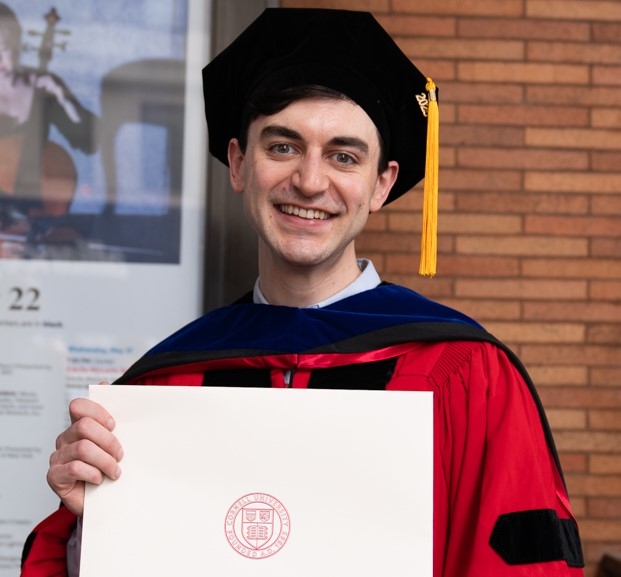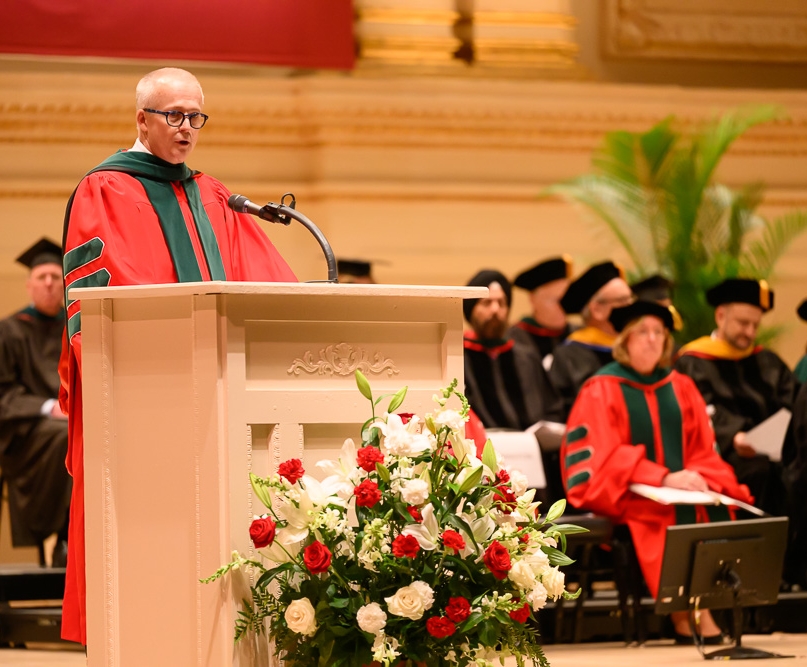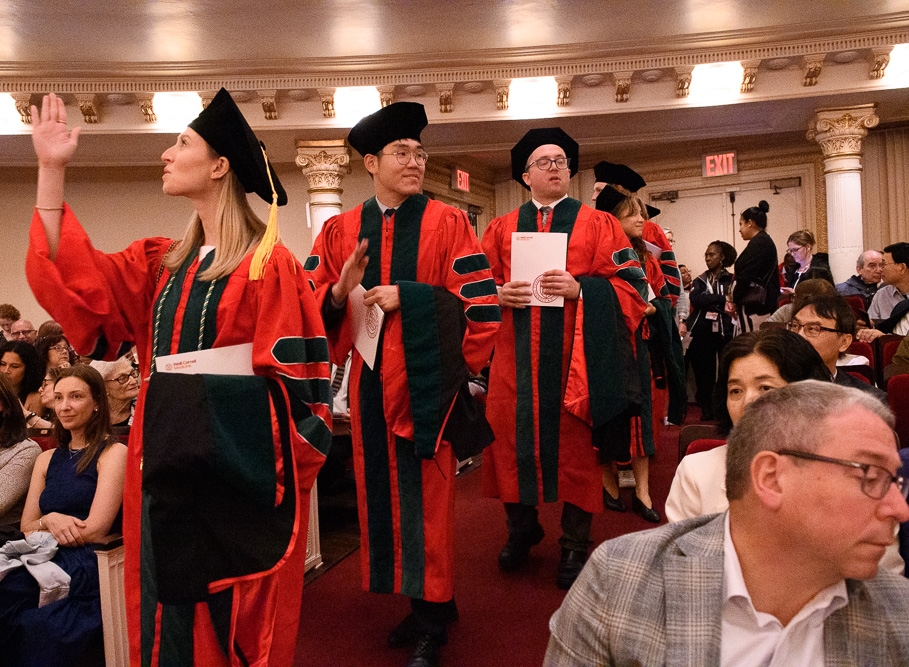For six years, Dr. Benjamin Allwein studied to be a scientist at Weill Cornell Graduate School of Medical Sciences, immersed in structural biology and biochemistry. His educational journey investigating proteins involved in metabolism and DNA replication was intellectually rewarding, but it was also bookended by uncertainty and disruption.
Dr. Allwein started his doctoral studies in July 2019, fresh off a year-long Fulbright Scholarship working with physicians in India. The COVID-19 pandemic struck within a year of beginning his studies and he lost a grandparent to the disease.

Dr. Benjamin Allwein celebrates after the ceremony.
“It made science very lonely for a while,” said Dr. Allwein, a first-generation college graduate who grew up in a town of 800 people in rural Pennsylvania. “And I feel like one of the great benefits of working in science, at academic centers, is the collaborative nature of it. That was really absent for a couple of years.”
Still, his passion for research remained. Then, as he approached his program’s completion, more disruption: federal biomedical research funding cuts that threatened public investment in science and imperiled postdoctoral research positions. He scoured the job market, finally landing a postdoc position at UC Berkeley conducting Parkinson’s disease therapeutics research.
“Getting to the end and having a job waiting, seeing the groundswell in the scientific community fighting for its importance, makes me feel like I'm part of something far larger than myself,” he said. “Something I began to develop in undergrad, then as a Fulbrighter, and now to fully realize it, is amazing.”
Dr. Allwein was among 450 expected graduates – 98 medical doctors, 49 physician assistants, 116 with doctorates and 187 with Master of Science degrees – in the Class of 2025 who received their degrees from Weill Cornell Medicine during the institution’s annual Commencement ceremony May 15 at Carnegie Hall.
Cornell President Michael I. Kotlikoff joined Deans Robert A. Harrington and Barbara Hempstead in conferring degrees on students graduating from Weill Cornell Medical College and Weill Cornell Graduate School of Medical Sciences. Graduates crossed the Perelman Stage to receive their diplomas in front of an audience of cheering classmates, family and friends.
Dr. Harrington, the Stephen and Suzanne Weiss Dean of Weill Cornell Medicine and provost for medical affairs of Cornell University, highlighted the strong foundation the institution has given the graduates, preparing them to flourish in their future careers in science and health care.

Dean Harrington addresses the audience at the 2025 commencement ceremony on May 15. Photo credit: Amelia Panico.
“With the education and training that your faculty has provided, you are ready to innovate and to make your case, whether you intend to change standards of medical care, deploy new large language models through artificial intelligence or to challenge people spreading disinformation,” he said. “Whatever direction you take, we – your teachers, your friends, your community and your family – all believe you’re on the road to success.”
Weill Cornell Medicine-Qatar also celebrated 45 graduates during its commencement ceremony May 7, with Dean Harrington and President Kotlikoff in attendance.
With their formal education complete, members of Weill Cornell Medicine’s Class of 2025 will now embark on residencies, fellowships and postdoctoral positions, as they advance to careers as physicians, scientists, physician assistants and leaders in health care.
In his address, President Kotlikoff emphasized the importance of being part of a thriving community, like the one established at Weill Cornell Medicine, and the value of listening.
“Little builds community like the shared challenges and effort of a difficult and demanding training,” he said. “As budding physicians, physician assistants and scientists, you have learned, over your years at Cornell, how to work hard and work together, how to listen to mentors, patients and each other. Listening to another person – really listening – is the art of medicine, but it’s also, in many ways, the art of life.”
Dr. Hempstead, dean of Weill Cornell Graduate School of Medical Sciences, challenged the graduates “to be our Galileos,” invoking the famed astronomer as she urged the students to strive for innovation.
“Use the enormous tools at your disposal, for the betterment of the health of others,” she said. “Challenge yourselves to focus upon the hardest questions, to understand and alter the course of chronic diseases, to develop new therapies, to determine the impact of our rapidly changing environment on humanity at large.”
Graduate school student speaker Dr. Chiara Mancinelli outlined the achievements of the graduating class and noted how personal science can be.
“Behind every data point, every successful experiment and every discovery is a story—a motivation fueled by compassion, determination and hope,” said Dr. Mancinelli, who will soon be a postdoctoral associate at Yale School of Medicine. “As scientific and medical professionals, we’ve had the extraordinary privilege of contributing meaningfully to human health.”
Dr. Karena Zhao, this year’s medical college student speaker, spoke of the gravity of the moment and the values instilled in the graduates as they continue their medical journeys.
“We are stepping into a role that will ask more of us—our attention, our judgment, our presence,” said Dr. Zhao, who will be starting her residency in otolaryngology at NYU Langone. “And while we’ll keep growing, we already know what matters most. We’ve learned that how we show up for others — with humility, with clarity, with care — is what defines us, not just as physicians, but as people.”
For Dr. Rachel Hill, a career as a physician means the opportunity to help others, particularly underserved and historically marginalized communities—a mission she is deeply passionate about.
“I think too often the people who really need care the most are the ones who face the greatest barriers,” said Dr. Hill, who initially pursued accounting before pivoting to medicine. “Medicine to me is about more than treating illness. It's about asking why someone didn’t get help sooner and then taking tangible steps to change that.”
Case in point: Dr. Hill’s advocacy for a free dermatology clinic at the Weill Cornell Community Clinic, a student-run program serving uninsured New Yorkers, progressed into a pilot program offered once a quarter. “The clinic is still in its very early stages, but even now we see its potential to make an impact in expanding access to care for underserved patients,” said Dr. Hill, who will be pursuing her residency in dermatology at NYU Langone.
“Ultimately, I think our communities really value doctors who want to go the extra mile for them,” she said. “And I know that my graduating classmates and I are ready to answer that call.”

